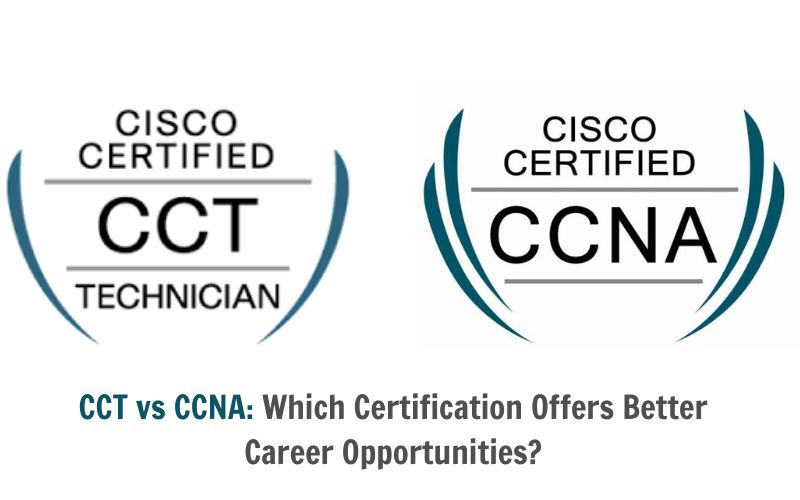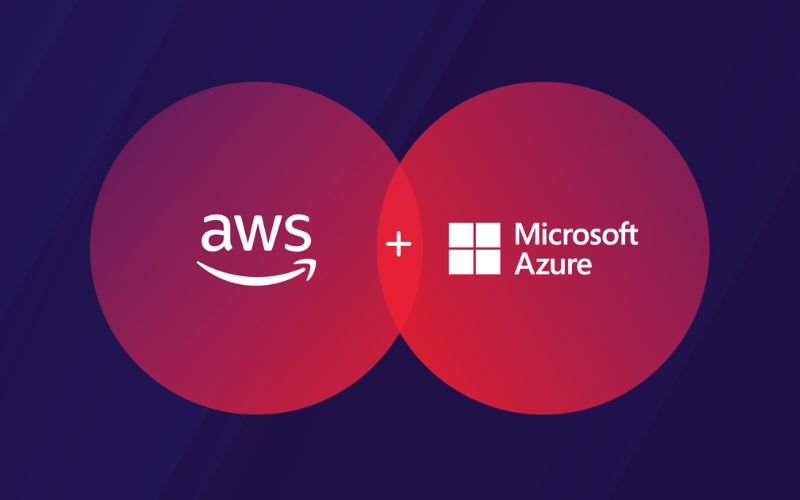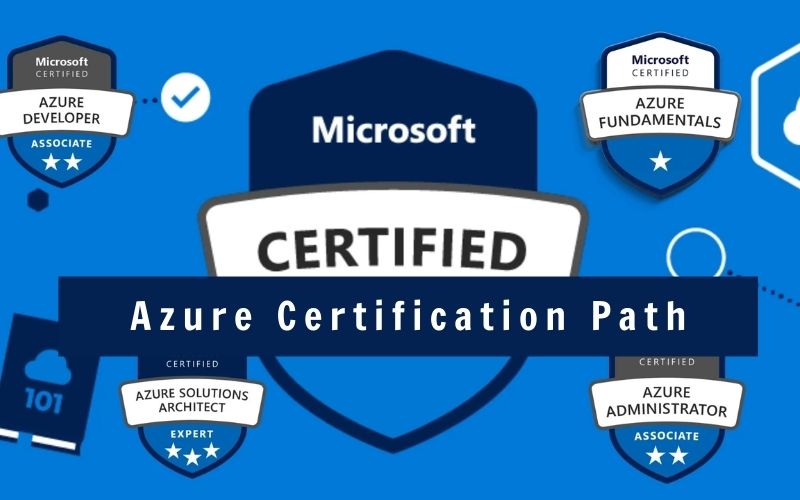If you are looking to advance your career in information security, you might have heard of the Certified Information Systems Security Professional (CISSP) certification. CISSP is a globally recognized certification that validates your expertise in designing, implementing, and managing cybersecurity programs. In this article, IT Exams will guide you through the CISSP certification path, from understanding the exam requirements to preparing for the test and obtaining your certification.
What Is CISSP Certification?

Certified Information Systems Security Professional (CISSP) is an information security certification developed by the International Information Systems Security Certification Consortium, also known as (ISC)². The CISSP designation is a globally recognized, vendor-neutral standard attesting to an IT security professional’s technical skills and hands-on experience implementing and managing a security program.
CISSP certification is highly sought after by IT professionals. Hiring organizations often look for candidates who have passed the CISSP exam because candidates with the CISSP credential must be sufficiently knowledgeable about cybersecurity to be able to pass the certification exam, and have hands-on experience and, potentially, formal CISSP training.
Why Is It Important To Get CISSP Certified?
One of the most important aspects of CISSP certification is that top businesses recognize it. Hiring managers want Certified Information Systems Security Professionals who can clearly demonstrate the market’s high demand for this credential.
It takes a lot of effort, fervor, and devotion to obtain the (ISC)² CISSP certification; this is why the CISSP certified is also a highly compensated professional.
The CISSP certification is recognized globally, and prominent firms value it. They are continuously on the search for CISSP-certified experts who have the necessary knowledge, devotion, ability, and competence to take on information security duties.
The Certified Information Systems Security Professional credential is the first in information security and has been gaining popularity for over three decades. Furthermore, with the rise in cybercrime and malicious assaults, this certification is extremely respectable and marketable for a professional.
Members who get the CISSP certification receive several benefits, including free webinars, networking opportunities, worldwide recognition, educational savings, and invitations to free events.
With recent technological advancements like cloud computing, big data, and social media interaction, it is increasingly critical to acquire individuals who can handle Information Security positions, which has resulted in high demand for the CISSP skill set.
Cybersecurity is a prestigious job among many others. CISSP certification holders may expect to earn very high pay, much like in the United States. They earn between $120,000 and $150,000 a year on average. When compared to non-certified applicants, certified candidates get a higher pay scale.
What Is CISSP Certification Path?
Ensure the CISSP is Right for You
Target Audiences of CISSP
The CISSP is appropriate for experienced security practitioners, managers, and executives who want to demonstrate their understanding of a wide range of security techniques and concepts, such as those in the following roles:
- Security Architects
- Security Managers
- Network Architects
- Security Auditors
- Security Consultants
- CIOs
- Security Analysts
- Director of Security
- Security Systems Engineers
- Anybody who wishes to acquire expertise/knowledge of internationally acknowledged CISSP information security principles
- Anybody who is looking to pass their CISSP Certification Exam
Eligibility Requirements for CISSP

Candidates must have a minimum of five years of paid work experience in two or more of the CISSP CBK areas. One year of needed experience can be satisfied by earning a four-year college degree or regional equivalent, or an extra credential from the (ISC)² recognized list. Only one year of experience will be satisfied by education credit.
A candidate who lacks the necessary experience to become a CISSP may become an Associate of (ISC)² by passing the CISSP test. The Associate of (ISC)² will thereafter have six years to gain the requisite five years of experience.
In addition, your work experience must fall within two or more of the eight domains of the (ISC)² CISSP CBK:
- Domain 1. Security and Risk Management
- Domain 2. Asset Security
- Domain 3. Security Architecture and Engineering
- Domain 4. Communication and Network Security
- Domain 5. Identity and Access Management (IAM)
- Domain 6. Security Assessment and Testing
- Domain 7. Security Operations
- Domain 8. Software Development Security
Full-Time Experience: Your job experience is accumulated on a monthly basis. To gain one month of work experience, you must have worked a minimum of 35 hours per week for four weeks.
Part-Time Experience: Your part-time experience must be for a minimum of 20 hours per week and a maximum of 34 hours per week.
- 1040 part-time hours equals 6 months of full-time experience
- 2080 part-time hours equals 12 months of full-time experience
Internship: Paid or unpaid internships are accepted. Documentation on company/organization letterhead proving your role as an intern is required. If you are interning at a school, the paperwork should be printed on the registrar’s letterhead.
You may replace up to one year of work experience if you have one of the following:
- A four-year college degree or its equivalent in another location
- A master’s degree in information security from the National Center of Academic Excellence in Information Assurance Education (CAE/IA) in the United States
Another option is to obtain one of many (ISC)² certified credentials, such as the SSCP, CCSP, or CAP, which can be replaced for one year of work experience. Individuals with a relevant degree, such as a Bachelor’s or Master’s degree in a cybersecurity-related discipline, can also replace one or two years of work experience.
Register and Prepare for CISSP Exam

Exam Format and Structure
The CISSP exam comprises 250 multiple-choice questions on a computer. The exam covers the eight (ISC)² security domains and is meant to assess a candidate’s knowledge and comprehension of each topic. The following are eight domains:
- Security and Risk Management (15%)
- Asset Security (10%)
- Security Architecture and Engineering (13%)
- Communication and Network Security (13%)
- Identity and Access Management (IAM) (13%)
- Security Assessment and Testing (12%)
- Security Operations (13%)
- Software Development Security (11%)
To acquire CISSP certification, applicants must complete the test in six hours and with a score of 700 out of 1000. The CISSP test costs $699 for non-members and $599 for members of the (ISC)².
If you are ready to seek the CISSP certification, register for the test right now. Create an account with Pearson VUE, the premier supplier of global, computer-based testing for certification and licensure tests, to schedule your exam. Their website contains information about testing sites, rules, accommodations, and other topics.
Study Resources
There are several tools available to assist applicants in preparing for the CISSP test, including official (ISC)² study materials, study groups, and preparation courses. The Official (ISC)² Guide to the CISSP CBK, CISSP practice exams, and online training are all available from (ISC)².
Study groups allow applicants to collaborate and study with other people who are prepared for the test. In-person or online preparation classes provide applicants with a systematic and thorough approach to test preparation, frequently with experienced instructors and extensive study materials.
Tips for Effective Exam Preparation
The CISSP test might be difficult to prepare for, but with the correct study tactics, you can improve your chances of passing. Here are some preparation recommendations for the CISSP exam:
- Create a reasonable revision timetable. Determine how much work you have to accomplish and how much time you have to complete it in, then divide it into manageable parts. Aim for a few hours of revision every day, and mix up your subjects to avoid boredom.
- Find a revising method that works for you. Some people like to study alone in a quiet area, but not everyone enjoys working in solitude. Try softly playing music in the background or rehearsing with a buddy (but don’t let them distract you).
- Make your remarks more personal by personalizing them. Experiment with color coding, notes on postcards, diagrams, or anything else that will help you study your subject.
- Check that you understand everything. If you come across anything you don’t understand, look for a fresh source of knowledge to assist you comprehend it. Simply remembering it will not assist you in your exam. If you need assistance, do not be hesitant to approach your instructor or a friend.
- Examine previous test papers. It means you may get a feel for the layout and the kind of questions you will be asked. To enhance your test technique, practice completing exam papers within the time limit.
- Take brief breaks on a regular basis. Studying for hours and hours will simply exhaust you and disrupt your attention, making you even more worried. A 45-minute to 60-minute break is about right.
- Give yourself a treat. After finishing your review session, you may, for example, take a lengthy bath or watch a fantastic movie.
- Perform physical activity. When you’re not editing, utilize your free time to do something active instead of reading. Exercise can help you sleep better by getting your mind off stress and keeping you cheerful.
- Request assistance. If you are stressed, talk to someone you can trust, such as a family member, teacher, or friend. Exams are challenging for many individuals, so do not be embarrassed to seek assistance.
Exam preparation must also include a focus on weak areas. Candidates should commit more time to domains in which they are less familiar or comfortable, and they may consider exploring additional resources, such as study groups or preparatory courses, to deepen their expertise in those areas.
Read more >> CASP vs CISSP: Get Great Jobs With CASP And CISSP

Tips for Exam Day
- Prepare yourself. Start the day with a healthy meal and leave plenty of time to travel to the exam hall. Take everything you’ll need, including pencils, pens, and a calculator. A bottle of water and Kleenex are also handy.
- Take some time to read through the instructions and questions. Then you’ll know precisely what to anticipate. If something is confusing, ask an exam supervisor for assistance.
- Determine how much time you’ll need to answer each question. If you get stuck on a question, don’t worry; instead, attempt to leave yourself enough time at the end to return to it.
- Forget about it after the exam is over. Spend as little time as possible mulling over it in your brain or comparing answers with your pals. Instead, concentrate on the next exam.
Get Your CISSP Certification
Complete the Certification Application Process
When you receive word that you have passed the exam, you may begin the online certification application procedure. This method verifies that your claims about professional expertise are correct and that you are in good standing in the cybersecurity field. It also includes pledges to follow the (ISC)² Code of Ethics and a privacy policy.
Agree to the (ISC)² Code of Ethics
All (ISC)² certified information security professionals understand that certification is a privilege that must be achieved and maintained. All (ISC)2 members must agree to fully support the (ISC)² Code of Ethics Canons:
- Protect society, the common good, necessary public trust and confidence, and the infrastructure.
- Act honorably, honestly, justly, responsibly, and legally.
- Provide diligent and competent service to principles.
- Advance and protect the profession.
Pay Your First Annual Maintenance Fee
(ISC)² uses Annual Maintenance Fees (AMFs) to cover the expenses of maintaining (ISC)² certifications and related support systems. This charge is due every year after the first year of certification and covers the costs of (ISC)² membership and certification maintenance.
Renewal Your Certification
Three key requirements must be met in order to renew your CISSP. First and foremost, you must follow the code of ethics. Second, for renewal, you must obtain 120 CISSP CPE credits over a three-year period and 40 CPE credits each year. Finally, after completing the 120 CPEs credit for CISSP renewal, you must have paid the yearly (ISC)² membership cost of $85 each year.
If you meet all of these requirements, you will be able to renew your CISSP certification without difficulty. If you are a working professional with limited time, we propose CISSP CPE credits online tools to meet your CISSP CPE requirements and renew your certification.
Why And How To Earn CPE Credits?
Continuous professional development is required for CISSP certification to guarantee that certified persons are up to date on the newest advances in the area. To retain their certification, certified persons must complete various CISSP CPE requirements, such as acquiring and submitting a certain amount of Continuing Professional Education (CPE) credits during a three-year cycle.

Types of Activities That Qualify for CPE Credits
Attending conferences, completing training courses, producing publications, and teaching courses are all examples of activities that may be utilized to earn CPE credits. Volunteering for professional organizations, for example, can also count for CPE credits.
It should be noted that not all activities qualify for CPE credits and that activities must be related to the CISSP Common Body of Knowledge (CBK) in order to be approved. For a comprehensive list of activities that qualify for CPE credits, candidates should reference the official (ISC)² criteria.
How to Submit CPE Credits
Certified individuals can track their progress toward certification renewal and submit CPE credits online using the (ISC)² website. Individuals should keep thorough records of their activities and CPE credits acquired to ensure that they satisfy the requirements for certification renewal.
Certified professionals may retain their CISSP certification and demonstrate their dedication to professional development and excellence by remaining current with the latest innovations in the area and earning CPE credits.

CISSP Certification Career Opportunities
Earning the CISSP certification can open up a plethora of employment prospects for cybersecurity experts. The qualification is generally accepted by companies all around the world and is frequently required for positions such as:
- Security Analyst
- Security Consultant
- Security Manager
- Security Architect
- Chief Information Security Officer (CISO)
- Risk Manager
- Security Auditor
- Penetration Tester
CISSP-certified professionals can also expect to make more money than individuals who do not hold the certification. According to a Global Knowledge 2021 poll, CISSP-certified workers earn an average of $141,452 per year, which is much more than the average wage for non-certified cybersecurity specialists. Furthermore, according to the poll, CISSP certification is one of the top five highest-paying qualifications in the IT business.
The need for cybersecurity specialists is increasing quickly, and persons with CISSP certification are in particularly high demand. The credential is widely recognized and is frequently required for employment in government agencies, financial institutions, and other big businesses. It proves that a person possesses the knowledge and abilities required to defend against cybersecurity threats and execute effective security procedures.

CISSP vs. Other Cybersecurity Certifications
CISSP is widely recognized as the gold standard in cybersecurity qualifications. However, there are additional qualifications that might be useful in the subject of cybersecurity. Let’s see how the CISSP compares to other cybersecurity certificates.
-
CompTIA Security+
CompTIA Security+ is an entry-level certification that is frequently used as a stepping stone to higher-level certifications such as CISSP. It addresses a wide range of issues, including network security, cryptography, and risk management. While it is not as extensive as the CISSP, it is nevertheless an important certification to acquire and may serve as a solid starting point for people new to the cybersecurity profession.
-
Certified Ethical Hacker (CEH)
The Certified Ethical Hacker (CEH) credential is primarily concerned with ethical hacking and penetration testing. It is intended to teach users how to think like a hacker and find system weaknesses. While not as wide as CISSP, it is an important certification for people interested in offensive security.
-
Certified Information Security Manager (CISM)
The Certified Information Security Manager (CISM) credential is primarily concerned with information security management. It addresses issues including risk management, governance, and compliance. While not as technical as CISSP, it is an important credential for people seeking managerial roles in the cybersecurity area.
-
Certified Information Systems Auditor (CISA)
The Certified Information Systems Auditor (CISA) credential focuses on information system auditing, monitoring, and analyzing. Auditing, governance, and risk management are among the subjects covered. While it is not as complex as CISSP, it is a beneficial certification for people interested in cybersecurity audits and compliance.
In terms of compensation and career potential, the CISSP certification is often regarded as the most useful in the cybersecurity profession. CISSP-certified workers make an average annual income of $141,452 according to the International Information System Security Certification Consortium (ISC)². Furthermore, CISSP is frequently required for senior-level cybersecurity roles.
FAQs

Can beginners take CISSP?
Is CISSP very hard?
How long do I need to study for CISSP?
How many people fail the CISSP?
How do I submit CPE credits for CISSP certification renewal?
CISSP holders must log in to their account on the International Information System Security Certification Consortium (ISC)² website and access to the CPE submission portal to submit CPE credits for CISSP certification renewal.
They may then submit information about their CPE activities, such as the kind of activity, the number of hours or credits gained, and supporting documents, such as certificates of completion or attendance, into the system. (ISC)² has a CPE manual that explains which actions are eligible for CPE credits and how to document and submit them.



